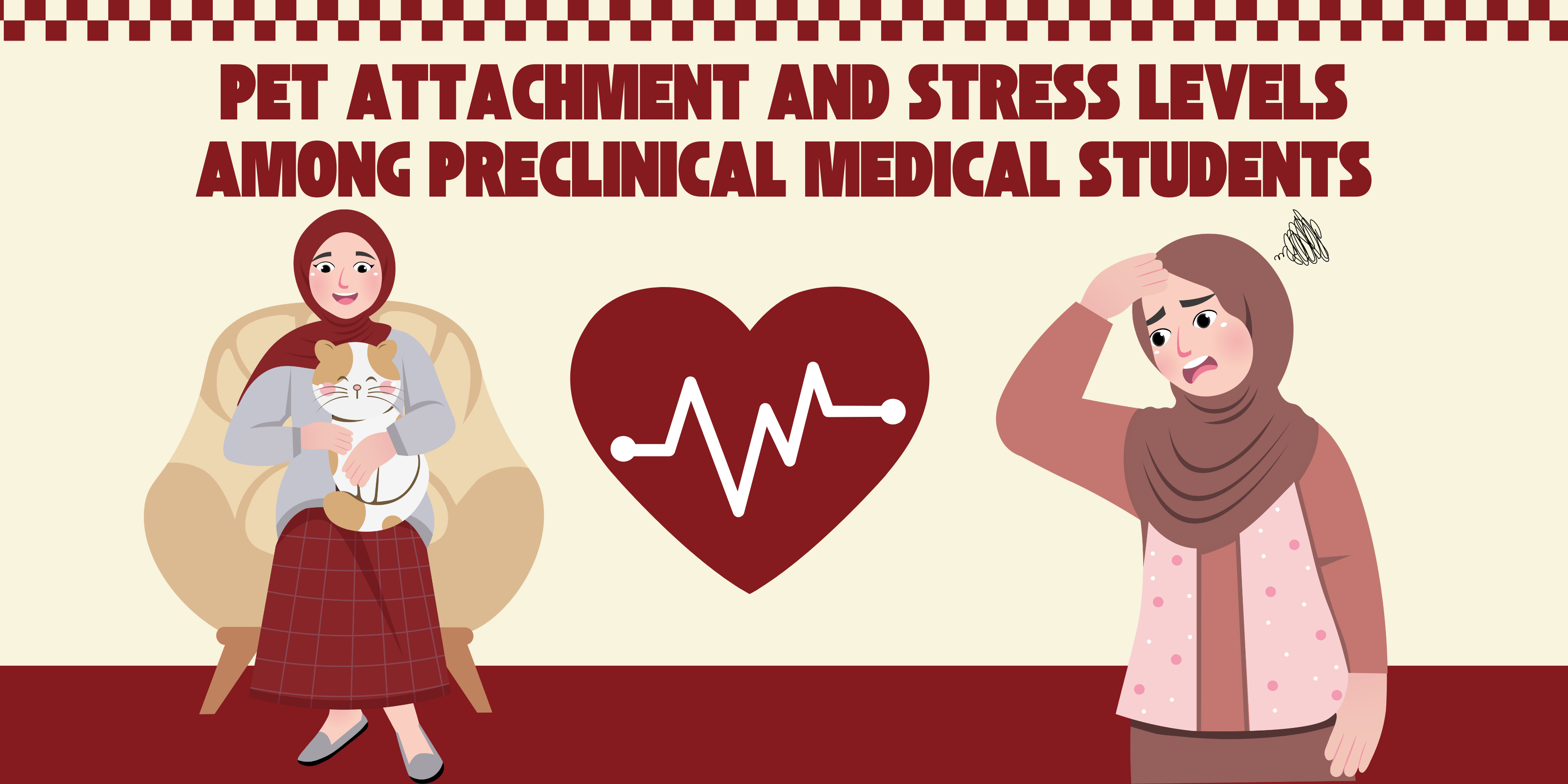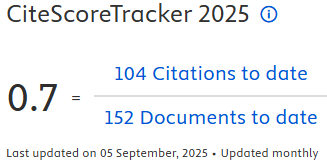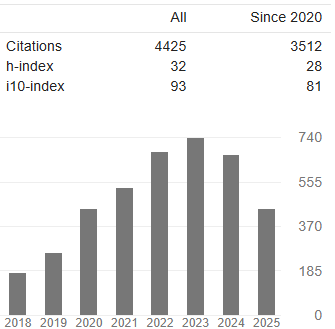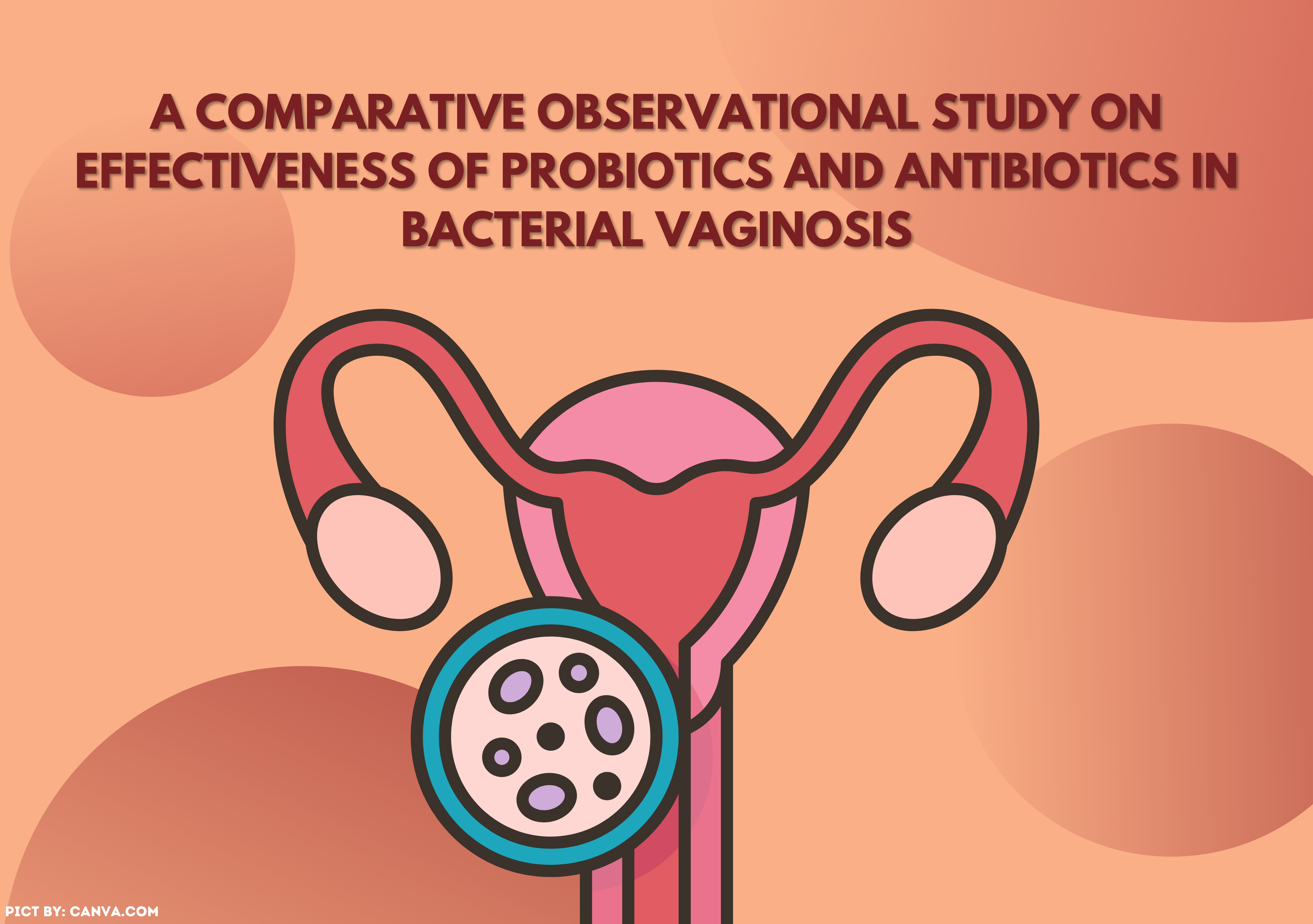PET ATTACHMENT AND STRESS LEVELS AMONG PRECLINICAL MEDICAL STUDENTS

Downloads
Introduction: Medical students are considered an academic group highly prone to stress, with prevalence rates ranging from 28.5% to 78%. Human-Animal Interaction (HAI) has been shown in several studies to correlate positively with stress reduction. A 2021 Rakuten Insight survey across 12 Eastern and Southern Asian countries reported that 41% of respondents kept pets to alleviate sadness and stress, while 36% cited companionship. Pets are seen as valuable emotional resources and adaptive tools for managing stress. Aims: This cross-sectional study was conducted to assess the levels of stress experienced by preclinical medical students. The study specifically aimed to explore the relationship between the degree of attachment these students have to their pets and their reported stress levels. Methods: A total of 100 preclinical students took part in this study. The pet attachment scores and stress levels were assessed using standard questionnaires. Data from this study were analyzed using a one-way ANOVA test and Post Hoc analysis. Results: The average pet attachment score in this study was 49.73. The pet attachment scores were higher in female participants and participants who kept their pets for over nine years. Most respondents experienced moderate stress levels (81%). Significant differences were found in the pet attachment score to mild-moderate stress levels (p = 0.001). Conclusion: The results obtained from this study lend support to the hypothesis that attachment to pets has a positive impact on stress levels.
Acoba, E.F., 2024. Social support and mental health: the mediating role of perceived stress. Frontiers in Psychology, 15, p.1330720. https://doi.org/10.3389/fpsyg.2024.1330720
Al-Shahrani, M.M., Alasmri, B.S., Al-Shahrani, R.M., Al-Moalwi, N.M., Al Qahtani, A.A. and Siddiqui, A.F., 2023. The Prevalence and Associated Factors of Academic Stress among Medical Students of King Khalid University: An Analytical Cross-Sectional Study. Healthcare, 11(14), p.2029. https://doi.org/10.3390/healthcare11142029
Applebaum, J.W., Tomlinson, C.A., Matijczak, A., McDonald, S.E. and Zsembik, B.A., 2020. The Concerns, Difficulties, and Stressors of Caring for Pets during COVID-19: Results from a Large Survey of U.S. Pet Owners. Animals, 10(10), p.1882. https://doi.org/10.3390/ani10101882
Aziz, F. and Khan, M.F., 2022. Association of Academic Stress, Acne Symptoms and Other Physical Symptoms in Medical Students of King Khalid University. International Journal of Environmental Research and Public Health, 19(14), p.8725. https://doi.org/10.3390/ijerph19148725
De Albuquerque, N.S., Costa, D.B., Dos Reis Rodrigues, G., Sessegolo, N.S., Moret-Tatay, C. and Irigaray, T.Q., 2023. Adaptation and psychometric properties of Lexington Attachment to Pets Scale: Brazilian version (LAPS-B). Journal of Veterinary Behavior, 61, pp.50–56. https://doi.org/10.1016/j.jveb.2022.12.005
Ebrahim, O.S., Sayed, H.A., Rabei, S. and Hegazy, N., 2024. Perceived stress and anxiety among medical students at Helwan University: A cross-sectional study. Journal of Public Health Research, 13(1), p.22799036241227891. https://doi.org/10.1177/22799036241227891.
Erliza, Y. and Atmasari, A., 2022. PENGARUH PET ATTACHMENT TERHADAP HAPPINESS PADA PEMILIK HEWAN PELIHARAAN DI KECAMATAN SUMBAWA. JURNAL PSIMAWA, 5(1), pp.54–62. https://doi.org/10.36761/jp.v5i1.1597
Hardi, N., Gracia, I. and Hananta, L., 2023. Second year of COVID-19 pandemic: mental health among Indonesian urban population. International Journal of Public Health Science (IJPHS), 12(4), p.1362. https://doi.org/10.11591/ijphs.v12i4.22787
Hawkins, R.D. and Brodie, Z.P., 2020. The role of human-pet attachment on people’s mental health and wellbeing over time during COVID-19 lockdown. NRS Mental Health 2020 Annual Scientific Meeting, United Kingdom.
Hielscher, B., Gansloßer, U. and Froboese, I., 2019. Attachment to Dogs and Cats in Germany: Translation of the Lexington Attachment to Pets Scale (LAPS) and Description of the Pet Owning Population in Germany. Human-animal interaction bulletin, p.hai.2019.0006. https://doi.org/10.1079/hai.2019.0006
Imelisa, R., Sarja, A.N.A.S. and Bolla, I.N., 2023. Penggunaan koping pet attachment untuk mengatasi stress akademik pada mahasiswa. JOURNAL OF Mental Health Concerns, 2(1), pp.16–22. https://doi.org/10.56922/mhc.v2i1.362.
Ines, M., Ricci-Bonot, C. and Mills, D.S., 2021. My Cat and Me-A Study of Cat Owner Perceptions of Their Bond and Relationship. Animals: an open access journal from MDPI, 11(6), p.1601. https://doi.org/10.3390/ani11061601
Janssens, M., Janssens, E., Eshuis, J., Lataster, J., Simons, M., Reijnders, J. and Jacobs, N., 2021. Companion Animals as Buffer against the Impact of Stress on Affect: An Experience Sampling Study. Animals, 11(8), p.2171. https://doi.org/10.3390/ani11082171
Johnson, T.P., Garrity, T.F. and Stallones, L., 2017. Lexington Attachment to Pets Scale. https://doi.org/10.1037/t59656-000.
Khalid, A. and Dildar, S., 2019. Effect of Pet Interaction on Stress Reduction and Positive Mood Enhancement among Pet-Owners and Non-Owners. Human-animal interaction bulletin, p.hai.2019.0005. https://doi.org/10.1079/hai.2019.0005
Lass-Hennemann, J., Schäfer, S.K., Sopp, M.R. and Michael, T., 2022. The relationship between attachment to pets and mental health: the shared link via attachment to humans. BMC Psychiatry, 22(1), p.586. https://doi.org/10.1186/s12888-022-04199-1
Mueller, M.K., King, E.K., Callina, K., Dowling-Guyer, S. and McCobb, E., 2021. Demographic and contextual factors as moderators of the relationship between pet ownership and health. Health Psychology and Behavioral Medicine, 9(1), pp.701–723. https://doi.org/10.1080/21642850.2021.1963254
Muldoon, J.C., Williams, J.M. and Currie, C., 2019. Differences in boys’ and girls’ attachment to pets in early-mid adolescence. Journal of Applied Developmental Psychology, 62, pp.50–58. https://doi.org/10.1016/j.appdev.2018.12.002
Optiarni, C.L. and Coralia, F., 2023. Pengaruh Pet Attachment terhadap Tingkat Stres pada Pemilik Hewan Peliharaan Kucing. Jurnal Riset Psikologi, 3(1), pp.39–46. https://doi.org/10.29313/jrp.v3i1.2032
Pacheco, J.P., Giacomin, H.T., Tam, W.W., Ribeiro, T.B., Arab, C., Bezerra, I.M. and Pinasco, G.C., 2017. Mental health problems among medical students in Brazil: a systematic review and meta-analysis. Revista Brasileira de Psiquiatria, 39(4), pp.369–378. https://doi.org/10.1590/1516-4446-2017-2223
Platto, S., Serres, A., Normando, S.R.C., Wang, Y. and Turner, D.C., 2022. Attachment and Perceived Stress among Pet Owners before and during the Lockdown in China. 5(1). https://doi.org/10.62845/y6H9ijc
Ragab, E.A., Dafallah, M.A., Salih, M.H., Osman, W.N., Osman, M., Miskeen, E., Taha, M.H., Ramadan, A., Ahmed, M., Abdalla, M.E. and Ahmed, M.H., 2021. Correction to: Stress and its correlates among medical students in six medical colleges: an attempt to understand the current situation. Middle East Current Psychiatry, 28(1), p.86. https://doi.org/10.1186/s43045-021-00170-0
Ruzhenkova, V.V., Ruzhenkov, V.A., Lukyantseva, I.S. and Anisimova, N.A., 2018. Academic stress and its effect on medical students’ mental health status. Drug Invention Today, 10(7).
Sable, P., 2013. The Pet Connection: An Attachment Perspective. Clinical Social Work Journal, 41(1), pp.93–99. https://doi.org/10.1007/s10615-012-0405-2
Smolkovic, I., Fajfar, M. and Mlinaric, V., 2012. Attachment to pets and interpersonal relationships: Can a four-legged friend replace a two-legged one? Journal of European Psychology Students, 3, p.15. https://doi.org/10.5334/jeps.ao
Sobering, J. and Brown, L., 2020. Comparing the Protective Value of Human and Pet Social Support on Well-Being of Older Adults During COVID-19. Innovation in Aging, 4(Supplement_1), pp.936–936. https://doi.org/10.1093/geroni/igaa057.3430
Temesi, A., Bunford, N. and Miklósi, Á., 2020. Associations among attitudes towards motherhood, pet-keeping, and postpartum depression symptoms. Biologia Futura, 71(1–2), pp.153–164. https://doi.org/10.1007/s42977-020-00007-7
Tsania, S.R., Hidayat, I.N. and Ramdani, Z., 2023. Pet Attachment Sebagai Mediator Pengaruh Perceived Stress Terhadap Affect Pada Mahasiswa Pemilik Kucing. Journal of Psychology Students, 2(2), pp.109–125. https://doi.org/10.15575/jops.v2i2.31039
Wu, C.S.T., Wong, R.S.M. and Chu, W.H., 2018. The Association of Pet Ownership and Attachment with Perceived Stress among Chinese Adults. Anthrozoös, 31(5), pp.577–586. https://doi.org/10.1080/08927936.2018.1505269
Copyright (c) 2025 The Indonesian Journal of Public Health

This work is licensed under a Creative Commons Attribution-NonCommercial-ShareAlike 4.0 International License.
- The authors agree to transfer the transfer copyright of the article to The Indonesian Journal of Public Health effective if and when the paper is accepted for publication.
- Authors and other parties are bound to the Creative Commons Attribution-NonCommercial-ShareAlike 4.0 International License for the published articles, legal formal aspect of journal publication accessibility refers to Creative Commons Attribution-NonCommercial-ShareAlike 4.0 International License (CC BY-NC-SA), implies that:
- Attribution ” You must give appropriate credit, provide a link to the license, and indicate if changes were made. You may do so in any reasonable manner, but not in any way that suggests the licensor endorses you or your use.
- NonCommercial ” You may not use the material for commercial purposes.
- ShareAlike ” If you remix, transform, or build upon the material, you must distribute your contributions under the same license as the original.































